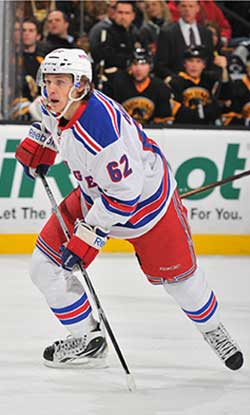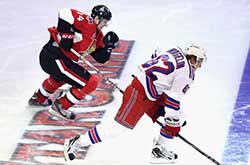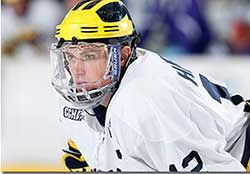New York Rangers left wing Carl Hagelin sits in front of his locker — legs crossed, hands folded. He’s hunched over with the hood of his sweatshirt pulled over his head as a mob of reporters surround him, firing questions left and right. Answering in both English and his native Swedish, Hagelin wears an expression of exasperation on his face. Fatigue is written all over his body.
It’s June 11, and the third-year forward has just helped the New York Rangers win Game 4 of the 2014 Stanley Cup Finals against the Los Angeles Kings. The hard-won victory cut the Kings’ lead in the series to three games to one, and Hagelin knows the Rangers have a mountain to climb. His team has much to prove if they want to become the sixth franchise in the history of the NHL to win a playoff series after losing the first three games.
Power play

“Whether it’s playmaking or getting open, his offensive game has really gone to another level,” U-M Hockey Coach Red Berenson told MGoBlue.com. (Image: USATSI courtesy of Michigan Athletics.)
The schedule of a 96-game NHL season has taken a toll on the athlete. But even though his body language says one thing, his voice says another. Hagelin speaks to reporters with a buoyancy in his voice, optimistic the Rangers can make the most critical comeback of the year.
He points to the 3-1 game deficit the Rangers overcame against the Penguins in the Eastern Conference Finals and the 3-0 deficit the Kings overcame just a few weeks earlier against the San Jose Sharks.
Proving oneself isn’t new to the Rangers, nor is it new to Hagelin, and so with the confidence befitting a veteran leader, he looks up and says they are going to take the remainder of the series one game at a time. He is matter-of-fact: The Rangers had done it before and they planned to do it again.
“It would surprise everyone but ourselves,” says the 25-year-old forward from Sodertalje, Sweden.
Replay
The reason Hagelin could be so confident was that he had done this before, and not just with the Rangers. Time and time again, Hagelin has surprised everyone but himself. On multiple occasions he has taken the bar of expectations others set for him and raised it a few notches.
He did it in Sweden, playing for Sodertalje’s J20 SuperElit team from 2005-07. As a speedy, undersized forward, Hagelin notched 44 goals and 51 assists during his two seasons with the team. He finished his time with Sodertalje SK ranked fifth in the club’s history in all-time points, fifth in goals, and fourth in goals-per-season.
At that time, Hagelin received interest from several schools but decided to join Red Berenson’s Michigan Wolverines, a program he had become familiar with since attending hockey camp at U-M as a young teen.
“It’s pretty amazing to look back, that there was a kid coming over from Sweden who ends up playing for us,” Michigan assistant coach Billy Powers told the Michigan Daily in 2011.
It only took Hagelin a few weeks to demonstrate the impact he would have on the program, surprising more than a few players and coaches.
Great expectations
When Hagelin arrived on campus, he was Michigan’s first European-born player in 15 years and the first-ever Swedish player in the program’s history. The coaching staff wasn’t really sure what they were going to get from the shy Swede, who was playing thousands of miles away from his home country.
But all their fears were quelled early in the fall during Hagelin’s freshman season.
Every year the Michigan hockey team participates in a fitness test during the offseason. For a full day, members of the team simply run the stairs in the Big House, a grueling test of stamina that could have wide-eyed freshmen wondering what they signed up for when deciding to join the Wolverines.
Not only do freshmen not know what to expect, they also never win. They almost never win, that is.
Ignorance was bliss that day in 2007 for Hagelin. He won once, twice, and every time they raced that day, surprising more than a few upperclassmen. In his four years at Michigan, Hagelin never lost a race in the Big House, compiling a 60-0 record.
“I had the chance to cover a few Michigan hockey games when he was there, and I saw him play quite a few times, and he’s always had that speed,” says NHL Network analyst Billy Jaffe. “That speed is what’s made him such a good player.”
Beloved by Michigan fans, Hagelin would wind up leading the Wolverines in scoring during his junior and senior years, taking the team to the national championship game during his senior season while winning the CCHA award for best defensive forward. Fans were known to unfurl a huge Swedish flag whenever he scored, and on Hagelin’s senior night, the hockey pep band played the Swedish national anthem.
Earlier this year, Hagelin earned his place as the seventh U-M ice hockey alumnus to win an Olympic medal. He won silver competing for his home nation of Sweden.
Now in his third year with the Rangers, Hagelin has raised that bar of expectations once again. After scoring a career-high 17 goals for the Rangers this past season, Hagelin was second on the roster, with seven postseason goals.
“He’s been a key player for us and he’s only going to continue to get better,” says Rangers left wing Rick Nash.
Passing the cup

With both the Wolverines and the NY Rangers, Hagelin quickly became a fan favorite for his speed and work ethic. (Image: USATSI courtesy of Michigan Athletics.)
A few nights after Game 4, the Rangers would fall to the Kings in an excruciating double overtime, ending the East vs. West series and effectively ending the season. The New York Times reported Game 5 of the Stanley Cup finals enthralled 6 million viewers on NBC June 13, making it the most-watched Game 5 of the finals in six years, according to the Nielsen Company.
And while there would be no 2014 Stanley Cup for Hagelin or the Rangers, there was an obvious silver lining in the series.
“He’s always been a great skater, as everyone knows, but he’s really learned when to use it and how to use it,” says the NHL Network’s Jaffe. “He’s such a smart, smart player and he’s just going to keep picking up things as his career goes on.”
For Hagelin it’s a career steeped in Wolverine tradition and pride.
“I’m very fortunate I went to Michigan,” Hagelin says. “It taught me a lot of life lessons and obviously helped me develop into the person and player I am today.”
(Top image courtesy of USATSI and Michigan Athletics.)




